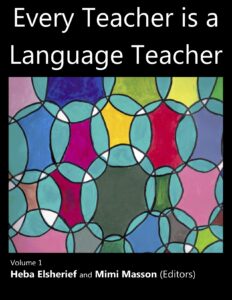Every Teacher is a Language Teacher
 Elsherief, H. & Masson, M. (Eds.) (2020). Every Teacher is a Language Teacher (Vol. 1). University of Ottawa Second Language Education Cohort (cL2c). http://dx.doi.org/10.20381/an3d-6k16
Elsherief, H. & Masson, M. (Eds.) (2020). Every Teacher is a Language Teacher (Vol. 1). University of Ottawa Second Language Education Cohort (cL2c). http://dx.doi.org/10.20381/an3d-6k16
Download the book in Word here.
Download the book in PDF format here.
This book disseminates practices shared at the annual event Every Teacher is a Language Teacher held at the Faculty of Education (uOttawa) for all first-year Bachelor of Education teacher candidates. The book is meant to serve as a textbook for Teacher Education courses, graduate courses, as well as an ongoing promotion of research-based practices created by Faculty of Education partners (faculty and graduate students alike) that should be shared more widely with Canadian language educators, teachers and consultants, particularly in its bilingual format. This publication is unique and particularly useful to both pre- and in-service teachers, as it offers modes of practice based on both research and theory. This means it is neither exclusively a lesson plan nor a theoretical analysis; but rather a synthesis that aims to show how the two domains inform one another. We see it as being immediately valuable for teacher and teacher educators, while also filling a gap in the field of language education more widely — one that embodies anti-racist, ethical paradigms within current interdisciplinary practice in its responsiveness to challenges of modern technology and globalization.
Click below to watch video summaries of each chapter:
Chapter 1: Creative Multimodal Poetry and Spoken Word Activities: Supporting Multilingual English Language Learners in K-12 Classrooms. Jennifer Burton, Wales Wong, Shakina Rajendram.
Chapter 2: Teachers as Status Experts: Lessons from Keith Johnstone’s Improv and Status Teachings. Steffi Retzlaff.
Chapter 3: What’s Art Got to Do with It? The Power of Drawing to Commit New Language and Concepts to Memory. Mimi Masson.
Chapter 4: Integrating First Languages in the Classroom: Helping to Facilitate Student Success. Diana Burchell, Redab Al Janaideh, Krystina Raymond, Jermeen Baddour, Xi Chen.
Chapter 5: Seize the Pen! Encouraging Writing Practice Across the Curriculum. Heba Elsherief.